Portland’s local bike culture and retail landscape has taken a few more hits.
The last decade has brought with it a sea change in Portland bicycle culture. The new decade looks to continue the trend as three beloved small businesses have decided to call it quits: Rivelo, Breadwinner Cafe, and Norther Cycles.
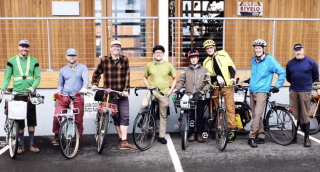
Rivelo was a small, niche shop located just off the Springwater Corridor near OMSI that specialized in Rivendell bikes. In addition to a well-curated selection of parts and accessories, the shop was known for its collection of Bob Dylan records and a love of riding slow. Rivelo opened in 2015 and shop owner John Bennett says he’ll play his last record at the end of this month. Bennett says he’ll miss running the shop and plans to spend his post-bike shop life as an AirBnB host. The shop’s Instagram account will live on.
Advertisement
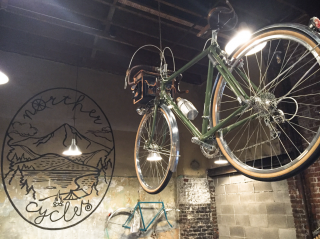
(Photo © J. Maus/BikePortland)
Norther Cycles owner Starmichael Bowman has also decided to throw in the towel. Bowman is a former co-owner of Kenton Cycle Repair who opened his doors on North Albina and Killingsworth in 2015. After over ten years in the local bike scene, Bowman said via Instagram last week, “I’m giving up on bikes, maybe forever, maybe not we’ll see how I feel way down the line.”
Norther was known for handmade randonneuring bikes and all the accessories only a true rando lover could appreciate (in February 2017 Path Less Pedaled paid a visit and called it “randonneuring paradise”). The shop was a collaboration between Bowman and bike maker Mark Simmons of Belladonna Cycles. It had a large shop space behind the retail store where Star and Mark could make nearly anything. Portland will miss their custom builds, creativity and expertise.
You can wish them well (and help them clear out any remaining inventory at huge savings) at a farewell party this Saturday (January 4th).
Advertisement
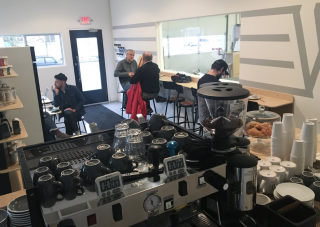
(Photo © J. Maus/BikePortland)
The closing of Breadwinner Cafe is a half-goodbye. Breadwinner Cycles — the custom bike business owned by Tony Pereira and Ira Ryan — is alive and well. Tony and Ira joined forces to launch Breadwinner in 2013. Four years later they moved into a shop and office space on North Williams at Page Street. The café opened in December 2017. Its last day will be Sunday, January 5th.
“We thought locating a bike-centric cafe on Williams would be a slam dunk, but it turns out that running a little restaurant is a lot more complicated than we figured,” Tony shared with me via email last week. “After two years of slow growth and despite a strong, small community that developed around it, the cafe has not brought in enough money to cover its costs.”
Tony added that closing the cafe will allow he and the rest of the Breadwinner crew to focus on making bikes and building custom wheels — something they do a lot more of since their purchase of Sugar Wheel Works in March 2019.
These are the last three closures in what was a bruising year for Portland’s vaunted bicycling ecosystem. 2019 saw the closure of A Better Cycle, Western Bikeworks’ Pearl District location, United Bicycle Institute, and Cyclone Bicycle Supply.
— Jonathan Maus: (503) 706-8804, @jonathan_maus on Twitter and jonathan@bikeportland.org
— Get our headlines delivered to your inbox.
— Support this independent community media outlet with a one-time contribution or monthly subscription.



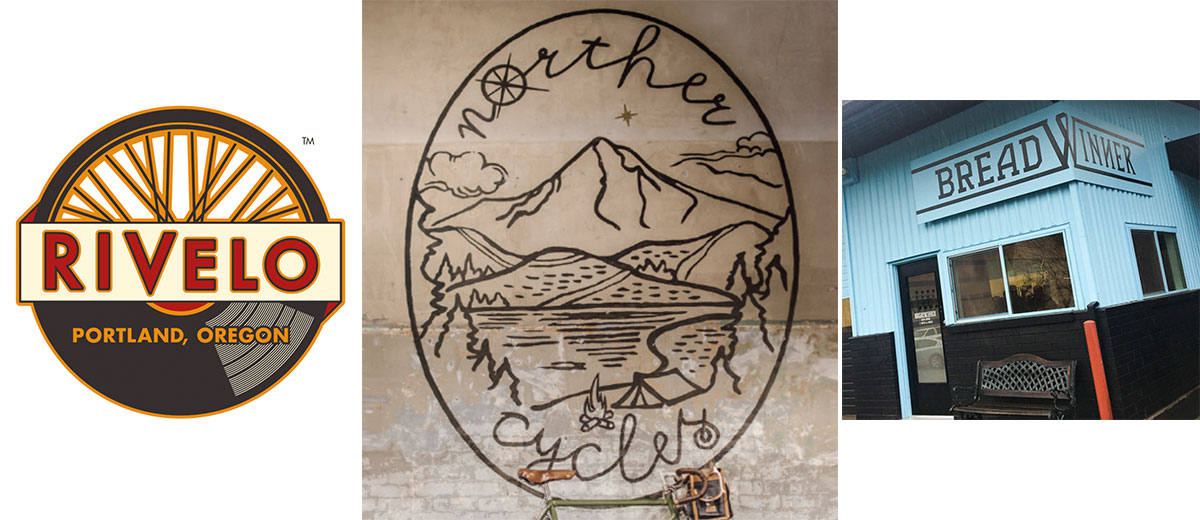
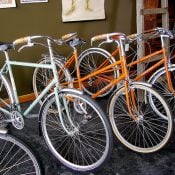
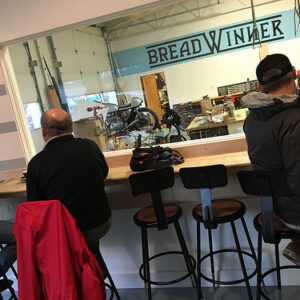
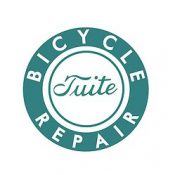

Thanks for reading.
BikePortland has served this community with independent community journalism since 2005. We rely on subscriptions from readers like you to survive. Your financial support is vital in keeping this valuable resource alive and well.
Please subscribe today to strengthen and expand our work.
That’s too bad on all accounts, but having a niche store in a smallish city is a tough market share. I will say, Breadwinner cafe had one of the best espressos I’ve had outside of Italy.
agreed. And these are all shops that opened fairly recently. You have to have a REALLY strong business plan to open a shop in 2013-2015, knowing the decline of local retail due to online shopping.
I’m surprised Rivelo lasted as long as it did…you’d have to go looking for it as it was in such an obscure location. At that point you better hope you have strong online sales and are a destination retailer. It’s a shame…I wish good people trying to start a business all the best as starting a small business and putting yourself out there is always a challenge and takes a huge emotional toll. I wish John Bennett the best…a really nice man from the one time I met him.
Breadwinner Cafe didn’t seem particularly inviting either. It’s not around anything else, and part of the problem of car-centric design is that the parking lot obscured the cafe. It’s a narrow space that was not conducive to hanging out or meeting people, and didn’t have a street facing view that allowed for people watching either.
Norther is a true loss though!
Almost as if capitalism rewards the rich developers rather than the small business owners 😐
…or we could stop buying bike stuff online and support our local small businesses. I’m honestly not too shocked about any of these. The city is over saturated with coffee stops and the other two were so niché that I’m surprised they made it this long.
People reward businesses that do a good job of serving the customer. Developers build the spaces for the businesses and people. They want to see businesses succeed otherwise people don’t buy or rent the spaces to do business. I suspect it is pretty tough to sell Rivendell and the like. Extremely expensive steel bikes without disc brakes are basically useless in wet places like the PNW particularly if you enjoy being able to stop your bike with any control.
Jon, I’ve been riding my Rivendell to Rivelo every day for the past five years in every kind of weather. We’ve sold plenty of bikes to many wonderful PNW customers. I am turning 64 in April and we are retiring. Thank you Portland for all of your support. Greatly appreciated!
I ride only steel bikes and I’m a member of the Rim Brake Resistance. I stop just fine. Been a daily rim braker since I was a BMX kid in the 80s and as an adult all-kinds-of-riding from the 90s on. Rivelo is a fantastic shop with cool stuff to check out.
I dig your anti-California snark in your other RIvendell related comment (I just bickered with a 49ers fan yesterday; go back to the bay!) But you’re wildly over exaggerating the scariness of rim brakes in the rain.
I rode rim bikes for 20+ years in the rain. Discs are better. I grew up in California. I love the place but the weather and riding in most of the state is much drier than in Portland. Not all new bike features are an upgrade over the old but discs are so much better than rim brakes. Steel, aluminum, carbon, and titanium frames all feel about the same to me but disc brakes are a huge step forward for controlled stopping particularly in the wet.
You don’t need disc brakes to stop in the rain. I’m not sure why people think that.
Rim brakes work when descending in the rain just fine, as long as you start your descent at 10mph or less and keep applying them all the way down. Disc brakes just work *much* better and don’t require you to brake until necessary, and they don’t wear out your rims in a Winter or two.
Way back in my rim days I would destroy a rear rim every 2 years and a front every 5 years (I’m a very heavy guy and was generally using double-wall double-eyelet rims). Now with disc my rear rims last 5 years (they eventually either volcano or the inner wall collapses) and front rims last, well, pretty much forever really. I also now use much wider rims – 30mm on the outside for narrow 32-40mm tires and 35-40mm rims for wider winter tires, both for 26ers/559 and 29ers/700c/622. On the other hand, I have to replace brake pads every 6 months for organics and at least once per year for sintered or semi-matalic. I have yet to replace a rotor, though I’ve warped a few (wait 6 months and most warped rotors will naturally return to a flat state.) And I have worn my pads to the bare steel, breaking the spring, but at least they still stopped. TRP and other dual-arm mechanicals stop well enough and don’t warp rotors, but for sheer stopping power, nothing quite beats an Avid BB7.
“For sheer stopping power, nothing quite beats an Avid BB7.”
Well, nothing except for pretty much every reputable hydraulic brake on the market. Aside from that, I’m with you 100%. Rim brakes work in wet conditions, but they destroy rims.
True, you don’t need disc brakes to stop in the rain. But you do need rims, and I’ve been through several since I moved to Oregon ten years ago. Before I moved to a wet climate, that kind of rim wear was just a theoretical possibility. Braking in wet conditions dramatically increases rim wear.
Jon, we all rode our bikes through Portland before disk brakes just fine. Salmon pads work well, btw. Rivendell did so much to promote practical and comfortable bikes. I’ve always wanted one.
Agreed. Keep your rims clean and be aware that your stopping distance is *slightly* longer in the rain. You’ll be fine.
There’s been an A frame sign advertising the breadwinner café planted right next to the bike lane for almost the past 2 years.
I really like Williams – I think it is much better than before.
Not me. I liked it much better before. Now it’s just confusing for bikes and for cars.
Wow, I didn’t realize how amazing my bike handling skills have been over the past 6 years commuting on exactly such a bike (though mine isn’t extremely expensive because 2nd hand).
This news is really, really sad. Both shops made beautiful, quality products that would last for decades. And indicative of how the local customer base HAS changed.
Riding with disc brakes in wet/slippery conditions is much nicer than rim brakes. If you have not tried them I suggest you do for your next bike. In the summer I have no problem riding rim brake bikes but in the wet I have found it to be much safer to ride disc brakes. My commute is not flat and stopping on wet downhills is much less predictable with rim brakes. Rivendell is completely anti-disc brake and very expensive which is probably ok for California where they are located but if you ride year around in the PNW discs are really much better.
meh. rim brakes work fine. I’m sure disc brakes are great, too, but rim brakes work fine.
and Rivendell bikes span roughly the same price range as Surly and fill a unique niche. if you haven’t tried them, I suggest you do for your next bike.
it’s fine that you don’t care for rim brakes or Rivendell, but you’re knocking down straw men here.
I’ve rode a steel bike with nice wheels and custom brakes downhill in the rain on the busiest streets in the West Hills and stopped fine.
I rode rim brakes for 20+ years and still use them today on dry days in the summer. I was late to disc brakes and used to tell all the folks that I rode with that v-brakes worked just fine. Then I got disc brakes and the difference was amazing. When rims are wet and you apply the brakes the first couple of rotations of the wheel have very little braking force as they squeegee the water off the rim. Also the rubber compound of rim brakes get harder as the temperature goes down so the braking response is always changing. I just don’t understand Rivendell’s no disc brake policy. My commute is through busy roads and hills. Just this year I had to brake to avoid a left hook from a car. Being able to brake consistently in all weather conditions is very important to me. I’ll never buy a rim bike again.
I’ve heard some stories, too, but I wonder if they’re apocryphal.
I’ve now worn several rims to the point that I collapsed them. while I certainly don’t recommend riding wheels that are that far gone, none of them ever failed catastrophically. they didn’t really fail at all: I only noticed something was amiss because of the little knock when the brakes hit the damaged part. none of them were even out of true.
I don’t agree, I have a steel frame bike with Paul Center Pull rim brakes that I ride all winter and a CoMotion Steel frame bike with disk brakes. The bike with rim brakes is at least as good in all weather conditions as the one with disks, but far smoother, and more linear in feel to the disk brakes which can introduce odd harmonics in to the fork and frame under hard braking. I can see the advantage of disk brakes for riding in muddy conditions but aside from that I view them as what we engineers call a ” solution in search of a problem.”
I know, right? Don’t get me wrong, I don’t agree with Grant Peterson that disc brakes are faddish and pointless. They definitely help in the rain. But somehow I’ve ridden in the PNW for two decades without them on any of my pavement bikes. And my rims haven’t exploded, and (fingers crossed) I’ve always been able to stop in time.
I’m a total convert to mechanical disc brakes, but even I’ll admit they have their issues. For example, you can’t toe-in the pads to eliminate or reduce that annoying high-pitched noise they make. Fortunately as I age, I’m no longer able to hear that high-pitched noise, but my fellow rim-brake riders tell me it sounds like a live canary that’s being strangled (when I’m stopping) or a really loud high-pitched cricket (when I’m just riding along). Since I can’t hear it, I find it hard to fix.
With the TRP mechanical brakes, you can toe in each pad.
Really? How? I have both SPYRE and SPYKE versions of TRP.
On the pulley arm right where it meets the brake body, there is a “3mm Pad in” adjustment screw. I tried to post the trp link but was not able to do it without being moderated.
I adjust that screw all the time, or regularly anyway, to move the whole pad towards the rotor as it gradually gets worn, but I’ll check it out a bit more closely. I had also thought of adjusting the center spring. Thanks for the tip!
I’m just saying there’s on in each side 🙂 The inboard-side one is tough to get to, but manageable. Hope it works out – FWIW, I did not notice it for over a year and a half!
Those screws don’t accomplish toe-in; they just move the pads closer to/farther from the rotor. Scroll down this page to learn what toe-in is: https://www.sheldonbrown.com/rim-brakes.html
Hey, you’re right. I was conflating “toe in” with “contacting at the same time” (which did minimize the noise I was getting).
Most of my pads are already organic, which means I have to replace them more often and check their wear, as well as the spring wear. Again, it’s not what hear, which is nothing, but what the rider next to me hears. There’s virtually no rubbing – every time I switch out out a wheel, I now reset the brakes to minimize rubbing, as a routine. But it’s that ever so slight warp in the rotor and the very close tolerances between the rotor and pads.
And is it too difficult to wipe down your rims and brake pads when you come in from a wet, dirty ride? Wipe off the dripping bike, wipe off the gritty rims and pads. Very basic maintenance.
I was wondering this as well. I am lucky that I have a bike room at work that’s indoor and we have a paper towel dispenser in it, but you could also bring a small rag with you. Each time I get to work I use a little piece of towel to wipe down the chain and jockey wheels, and if the rims look dirty I wipe them down as well as slide the paper towel between the rim and pad to get some grime off. After a few days in a row of the rims looking dirty (or if my braking seems to be getting more sluggish) I’ll take my wheels off at home and use some sand paper on the pads and quickly check for any imbedded debris. This has all helped my braking stay consistent in bad weather and extend the life of my rims and pads. And by the way, I highly recommend Kool Stop salmon pads for any type of riding, but especially wet weather!
Is it true that Universal Cycles will relocate to SW Walker Road in Cedar Hills?
Wait! Wha??? Universal is one of the closest bike shops that matches my needs. Cedar Hills might as well be on the moon as far as I’m concerned. That’s what happened to Veloce. They used to be on Hawthorne and since their move to the west end, the day I decided to visit them out there, they ended up having an unscheduled closure so I’ve never been back.
Can someone verify this? I do virtually all of my shopping at Universal, River City or Bike Tires Direct near the airport with Universal having the lion share of my business.
Yep, Universal is moving west, further west. End of February is there last day on E Burnside. At least, last I heard.
Well that’s a seriously bike-unfriendly location. My commute takes me there pretty regularly. Mall drivers, narrow bike lanes on urban freeways. Oh well.
Please tell WashCo to make the streets more bicycle-friendly.
https://www.co.washington.or.us/LUT/Divisions/TrafficEngineering/DesignInformation/neighborhood-bikeway-plan.cfm
that’s what I’ve heard too, from staff at the shop. there will be condos where Universal now stands.
Ever notice how on the websites leasing apartments or selling condos they always have a few pictures of the drab gray units the future tenants will actually inhabit and then many pictures of the cool, authentic surrounding bars, restaurants, bike shops and things. I am now sure that one day these developers and their lackeys will awake to a scenario similar to the one facing the Once-ler in the “Lorax” when he chopped down the last of the Truffula Trees. They will finish the most recent condo and find there are no more cool authentic surrounding business’s to put on the website. They will be just like the burbs with only a few scattered Starbucks and such, but with much higher rent. A dire future they will richly deserve.
Awesome, because this city really needs more condos, especially ones most folks can’t afford. Forcing Universal out of their Burnside location for more condos just adds more insult to injury.
I always love the comments that “people can’t afford the rent”. I’m fairly certain enough people do to build new apartments, or they wouldn’t get built. I think what your really mean is most people who read this website won’t be able to afford the rent.
Well, considering that Portland has thousands and thousands of vacant apartments- almost 17,000- there are apparently quite a few people who can’t afford them.
C’mon Portland, what’s the point of calling something ‘too niche’. I’m aware that unregulated capitalism spurs monopolies, but we should be calling for the ‘choice’ capitalist boosters claim it provides. My two cents… Norther is/was awesome, one of the best shops in the city. Call it rando or whatnot, but the shop always had a ton of useful, useable parts, something that many shops lack. And they could order anything a customer wanted, and usually at the same price you’d get it for online. The shop’s demise has a lot to do with their landlord. I won’t go into the details, but let’s just say it was a raw deal. Jonathan, it should be noted that Stoic Wheels is on a separate lease, and will keep going either at the same location, or in another. And Mark Simmons has talked about continuing as well, in another location. That said, Norther will be truly missed. A unique, useful and wonder place. If niche means useful to some but not all, then I fully support niche and the choice niche markets can provide.
I vowed never to go to Veloce again after he shafted his employees.
The shaft was what action?
Even with these closures, we are still blessed with a ridiculous number of incredibly well-stocked shops.
Other cities don’t have it as good.
The dream of the 90s is no longer alive in portland.
As for rim brakes, 140 years of use in the PCNW and everywhere else says they’re not “useless” at all.
140 years? You know bikes were fixed gears for a long while of the bicycle’s history right?
The link to Breadwinner goes to a cafe in Atlanta. Try https://breadwinnercycles.com/cafe/
I would have a hard time buying a bike online. When I bought my current bike, it was because it “felt right” when I test-rode it. The hassles of unboxing, assembling, then finding out a bike doesn’t “fit”, and trying to return it just seem sooooooo not worth it. I suppose I could study frame sizes and head/seat tube angles, chainstay/top tube lengths, etc. and take a mathematical approach to getting something close, but ugh. I could also go the used-from-a-private-seller route, as long as I could determine there were no, ahem, “provenance” issues, but there are other potential hassles going that route. I like buying new bikes from a real shop. On the other hand, it is a little too convenient to order a few brake pads or a new chain/cluster from The Company.
Unfortunately the shop I did buy from closed years ago, the shop a few doors down had already closed a couple of years before that, Performance just closed their B&M shop in Beaverton… It really does seem that our economy favors the large over the small. Without some kind of online retail option, it just doesn’t appear that any bike shop can compete on retail hardware. Is service (especially e-bike service) the place to be? Or are too many bikes made so cheaply that they are considered disposable rather than serviceable? It doesn’t take too many professional services to cost the same as a replacement bike, unless one does spend the cash for a hand-made, custom bike—something few folks have the means to do. How can a local shop serve the folks who buy a new bike every 10 – 15 years, do a lot of their own maintenance with parts they can order online, and only really need a shop when something goes wrong that they don’t have the tools or skills to fix? Strategically placed vending machines with tubes and patch kits?
I guess I don’t really have anything helpful to say, other than “that sucks”, which isn’t helpful, and “best of luck” to those closing shop and moving on.
I realize the loss of Performance was pretty minor in a city like Portland, but it was devastating in many smaller cities across the country. It had a solid reputation for the black community and other communities of color as being one of the few shops you could shop at and not be judged or be treated differently because of the color of your skin, your gender identity, or the weight of your belly. A few local shops have since tried to adjust or reeducate their workforce to be better able to interact with customers who aren’t fit white males, but alas they are still pretty rare out here.
I’ll be sad to see Rivelo go. I love Riv bikes, and I love Bob Dylan. But truth is I don’t have the scratch for a new Riv bike, and it’s too niche/out of the way to serve as my regular bike shop.
I visited the Breadwinner cafe once. There was nobody behind the counter. There were plenty of people in the shop, but they all seemed busy. I left without getting anything.
I mean you can see Breadwinners logic if you are in 2015. Williams was hypothetically supposed to a modern street. PBOT has completely failed on the Vancouver/Williams bike way leaving the businesses and people who live there to deal with the consequences. Williams is such a cluster and so congested with SOV traffic that I didn’t notice Breadwinner for the first year or year and half I commuted through Williams. My only focus when I am on Williams/Vancouver is other bikes in the congested bike lane and watching cars in the congested dangerous motorist only lanes.
N. Williams is a great example of PBOTs progressive talk hood-winking people and then their regressive policies screwing them over
Williams project was already designed and mostly implemented by 2015. There are bike shops on Williams Ave that have been around for the before and after. There are many factors at play in the changing local bike industry and I believe it’s disingenuous to blame bikeway congestion. If anything we should be celebrating bikeway congestion and aiming for that kind of use on all of our arterial bikeways.
I hate to be the one to say this, but I think the evidence is clear that Portland Peaked about 2015 and it has been downhill ever since. Like the Butterfly many beautiful things only last for a short time before fading away.
I GUESS it’s sad to see all these little shops go. But people grow and their needs change. When I left the bike industry in 2012, Citybikes had already evolved in response to a shifting demographic. In 1986, when it opened, a lot of surrounding housing was quite affordable and inhabited by folks who weren’t afraid to save money by getting their hands dirty (I.e., doing their own basic bike maintenance). Citybikes was perfect for them and business was robust enough for us to open a secon location.
Then, inflation and the internet came along and changed the landscape — the demographic. The newer inhabitants of inner SE wanted someone else to fix their flats, and they had no patience for the janky vagaries of used bikes. The best used parts were being hoarded and flipped online for twenty times what we would’ve sold them for in-house.
So after much hand-wringing and discussion, we adapted. We brought in new bikes. We charged more for used bikes and parts. We started selling online. And ultimately, we bought our buildings to provide a cushion of security for the business in the longer term.
Has it all been perfect and wonderful? Of course not. Lives change, times change, things happen and people move on. That’s also adaptation of a sort.
Don’t blame it all on “the evil developers” or “customers who shop online” — life happens and everyone has to adapt. Sometimes it works out; Citybikes still operates one small repair shop in its original location with a leaner workforce. And sometimes it still works out; I left Citybikes in 2012 and became a modestly successful touring musician with four albums to my credit. And sometimes it works out yet again; the people who leave closing shops or who move on to other projects (or have kids, or retire, or leave town) all adapt somehow.
Very, VERY few of us actually DIE as a result of not adapting.
This is not Mutual of Omaha’s Wild Kingdom.
We almost ALWAYS adapt and, even if it’s not what we imagined, something works out.
Best wishes to everyone moving on from the year’s closures and evolutions.
Once upon a time, long long ago, in a far off city called Portland, a local bike shop owner told me that there are three basic bike shop types:
1. Those who survive (or die) on profits alone. They may be primarily selling new bikes, or used bikes, or fixing bikes, online sales, or even using bikes to draw customers in (like REI which is chiefly a very profitable clothing store that happens to have low-margin bicycles.) There’s a high turnover of such businesses.
2. Those that are a tax write-off for the significant other in the relationship. Usually it’s a wife who is a realtor, lawyer, or doctor with a six-figure income who needs a tax loss and other deductions and a way of getting her husband out of the house and “working” during the day, even if it is a bit of a sham… A surprising number of bike shops fit this model, including the owner/operator I was learning from.
3. A money-laundering operation. Apparently ongoing sales losses and store debt are commodities that can be bundled and sold in derivative money markets, which can be useful if your primary business is either illegal/criminal (exporting meth for example), dubious (offshore accounts), or barely legal (selling cannabis in those states where it’s legal, but the banks won’t take your cash because it’s still illegal with the federal government.) So such business owners open legitimate boutique businesses with their accumulated cash, businesses that are designed specifically to loose money – clothing shops, jewelry, bike shops – where customers are often treated poorly but there’s a lot of new legitimate goods on display, often without price tags. The business losses are then sold to brokers, which can then be converted into credit to buy stuff for the illegal/dubious side of the operation.
how can I find out which of the three categories my LBS falls into?
If you are happy with your LBS, there’s really no reason to worry what type it is. Most of the time I’m completely oblivious myself. The only time to worry is when there are already too few bike shops in your community. We have just 5 full-service LBS for my city of 300,000 so we get worried when a shop owner starts to talk about quitting or retiring. The 3 types of LBS obviously doesn’t apply to local co-ops and nonprofits, long may they prosper and multiply.
Sorry to see all three of these shops close; I’m going to do a “sweep” of all three tomorrow, Saturday, just because I want to remember them. Listening to Dylan sing “Duquesne Whistle” in Rivelo’s honor as I write this….
As to the BW Cafe, well, like has been said, it never felt that inviting to me, just a place to meet for a minute while the ride for that day queued up. I really wanted it to be a place to just hang, like the late lamented VeloCult, but that was never going to happen. Not there, not in that building.
A front DRUM brake on a FIXIE is the best of all possible street bike worlds.
I bought a bike from Ira Ryan before breadwinner. Nice guy and. Beautiful frame. But hated the Avid brakes. Paul brakes fixed it. Best wishes to a skilled craftsman in a shrinking market. Somehow quality products are able to rise above market downturns
Possible comment of the week right there, especially that last line.
Time to accept Portland is not “Americas Bicycle Capital”.
Time to accept Portland is not “Americas Bicycle Capital”.
lol. It may well be still, it just doesn’t mean much.
And yet it continues to be. A city has very little control over its reputation. You and many others who live and bike in Portland likely see the very worst the city has to offer, the failures that PBOT and others failed to deliver. But to most people from outside of Portland who are local bike nuts or advocates will simply never have an opportunity to visit the city – it’s too far away, they have other priorities, family, work, etc. So they build their advocacy based upon what they believe Portland to be, it’s aura, the myth:
– In 2010 Portland adopted its ambitious 2030 bike plan and has since spent over $600 million on all the improvements called for in the plan, including some of the best protected bike lanes and bike bridges in the country.
– Portland has a national reputation among millennials for being well-planned, bike-friendly, cheap rent, easy-to-get meaningful employment in the arts, and vegan food carts.
– Portland is easier to get around in by bike than it is to drive and that an overwhelming majority of workers there never drive to work, but use the convenient bikeways, walkways, and transit instead. All the pictures of Portland show packed cyclists riding to work on the internet, so this must be true.
I’m not making any of this up. This is what I hear from planners and advocates here in NC.
This is such a touchingly sweet characterization as to be almost heartbreaking.
The reality is that what 6% of people commute by bike in this town? And the percentage is falling not rising. Driver’s have become more d*ckish lately as the traffic has gotten worse, enforcement has disappeared, and more Californians have moved in.
As this story shows, a lot of the local/handmade/artisinal/weird/lefty ideology that we bet hard on over the last few decades is easier to dream about than sustain. A backlash is rising, not just in the “heartland” but in a significant sector of the Portland population, and cyclists are right in their sights. I had one blaring his horn behind me on Vancouver yesterday.
I feel like PDX is reverting back to its mean- a branch office town full of C students beholden to absentee landlords.
If you found my comment about Portland “touchingly sweet”, then I’m not doing a very good job explaining myself. So let me try again:
In every US city large and small there are community members and city staff working to improve local walking, transit, and bicycle facilities for their most vulnerable community members, residents, and visitors – including the homeless, disabled, and people one disaster away from destitution. In order to convince their city council and/or city manager to spend limited city resources on such boring infrastructure as subsidized housing, sidewalks, and bike lanes – as opposed to stadiums, freeway bypasses, new airports, doubling police salaries, and repaving rich neighborhoods – these would-be reformers need to tell a convincing and compelling story of why money being spent for poor people to get around is such a great idea.
This is where the example of Portland comes in. Portland has a national reputation of being a sleepy industrial city of moderate size and income that hit hard times in the 1980s (something most US cities can directly relate to), but unlike most of its peers, it famously rejected building more freeways and instead built light rail, bike boulevards (called “greenways” in the rest of the USA), the Eastbank Esplanade, and revitalized its downtown. Anyone who visits Portland (and only a few local officials and businesspeople have from any one community) can attest to its downtown vitality, bicyclists everywhere (at least compared to their communities), transit that is full of rich white people (and not half-full buses with over 90% black riders), and are able to retain local institutions like Voodoo Donuts, Powell’s City of Books, and a public university all close in to downtown.
I have two associates here in Greensboro who visited Portland in 2016 for a transit convention. They saw what they were expected to see – excellent heavily-used transit, bicyclists nearly everywhere, bike racks, thriving downtown businesses, stuff they never see at home. They did not bother to see the stuff they see at home all the time – the car congestion, the homeless panhandling, lines for soup kitchens, high rents, inefficient government. And of course they never ventured outside of downtown except to take the MAX from their hotel to the airport on the Red Line, admiring the clean MAX vehicles the entire way and ignoring anything they saw outside. And hey are not unique, I’ve heard the same thing from so many others.
Having lived in Portland for 17 years, much of my time as a active transportation advocate, I agree that Portland doesn’t fully deserve its national reputation as America’s Best City for Bicycling, but I can fully appreciate why it has retained its title. The cities that may or may not be doing better than Portland already have the egos of a small planet – New York, Chicago, Minneapolis, Seattle – whereas Portland is relatively modest. For all the other modest cities, Portland is that shiny city on the hill, that Nirvana, the modest city that has “made it”. Our local advocates go to our city councils and city agencies and say, “We can do this too. We can have a incredible 5% of our daily commuters bicycling instead of the 0.2% we have now. We can can get 12% of our commuters to use transit instead of just 1.3%. We can be successful!”
Ah I get it. I thought you actually held some romantic image of Portland, rather than simply describing it.
I agree with many of your points. I think you’re right, the US is full of cities who’d like to hustle themselves into the cool kid clique like Portland seemingly has, but it’s not all its cracked up to be. The problem is that now that we’ve “made it” we find that we’re fundamentally still the poor relation. Most of the laughable militancy of PDX antifa is unconsciously about exactly this by the way. Stridency is the only currency the littlest rebel has to spend.
Who owns all these new apartment buildings, and thus 1/2 the city now? Out of town REITs fat with globalist cash? It’s not Portlanders who care about this community. They’re getting squashed out of business by the rents. I’d caution Greensboro and anywhere else against going down this path.
Been riding seriously (some racing, mostly commuting, touring and the like) for 32 years, and 27 of those have been in Portland. The city is certainly far, far better than in years past. Could it be better, of course. But rewind to when riding down N Interstate meant share a lane with double tractor trailers. Now, many drivers exhibit a courtesy unthinkable in other cities I visit, even cities in our own region. I want Portland to get better, and to do it faster, but rewind 10-20 years ago, and today’s bike infrastructure seems unreal. What gets me sad and a little angry is seeing great shops close (Norther) or move to the suburbs (Universal). These closures can make the convenience and practicality of cycling in Portland less so. Sure, I can still find stuff, I just have to go further and spend more time doing so; frankly, I’d rather spend that time riding somewhere else. I have no complaints on the coffee and beer front, but sometimes you want you bicycle stuff to be as easy to come by!
What is so bad about a Portland shop moving to the suburbs? Beaverton has just two shops in city limits and another shop that is 200 feet outside of city limits.
So why are bike stores closing shop? I don’t commute by bike and live on the west side. I thought the city is getting more dense with all the condos replacing houses and more people moving into Portland. Are these people not riding bikes and needing service for their bikes?
The retail “singularity” known as Amazon?
In the case of both Norther and Rivelo, I think it may have more to do with the style of bikes. I suspect that the type of buyer who may have been seduced by classic steel rim brake bikes even just a few years ago, might have a bought carbon gravel bikes instead?
I bought my custom steel bike 10 years ago. I’ll never buy another one because I’ll keep this one forever. I’ve owned a few mountain bikes, cross bikes, I’ll probably get a carbon and who knows how long that will last. Many of my past cycling friends are the same way, doesn’t leave much room for turn over in regards to custom steel bikes.
Not sure that many gravel bikes are carbon, but I definitely think of the various Surly and Salsa bikes including gravels as competing in the same space as Rivendell’s “country bikes,” just with a more modern sensibility.
Californians are the epitome of car head culture. They do not ride bikes.
…and there lots of states and cities, such as in the Southeast and Great Plains, that make even LA look good in comparison…
There are a lot of recreational cyclists in the south bay area. Precious few bike commuters, however.
Having lived in Davis for ten years and being the recipient of 17K in fines that netted me almost three months in Yolo County jail to pay them off, I would say that your statement may need some refining.
Davis is a far cry from the early days in the 70s when it received that special bike status, I watched firsthand the city grow with implementation more for cars than cycling and recent visits it hasn’t changed.
Yes, it’s better than many places but still going in the opposite direction but continually claims otherwise.
I read with sadness that Norther is closing. I heard rumors that Universal was moving outside of Portland proper. It was an unsurprising surprise to hear that Rivelo is closing at end of month. There will be others closing, and possibly others to open in neighborhoods that have been starved of a LBS for a generation or 2. The bike scene is in constant flux, like everything else in life and in cities.
And there are 50+ Local Bike Shops that are here to stay. Some of us focus on weird niches. We just want to fix your bike, no matter what brand, style, or level of decrepitude it is in. We are still here. Because the Internet can’t fix your flat or remove that brake squeal. The tools and hands and expertise do not magically exit from your smartphone to do the thing.
Sad to see the demise of places like Rivelo….though Norther was an interesting shop personality issues were a definite turn-off…..Star Michael!